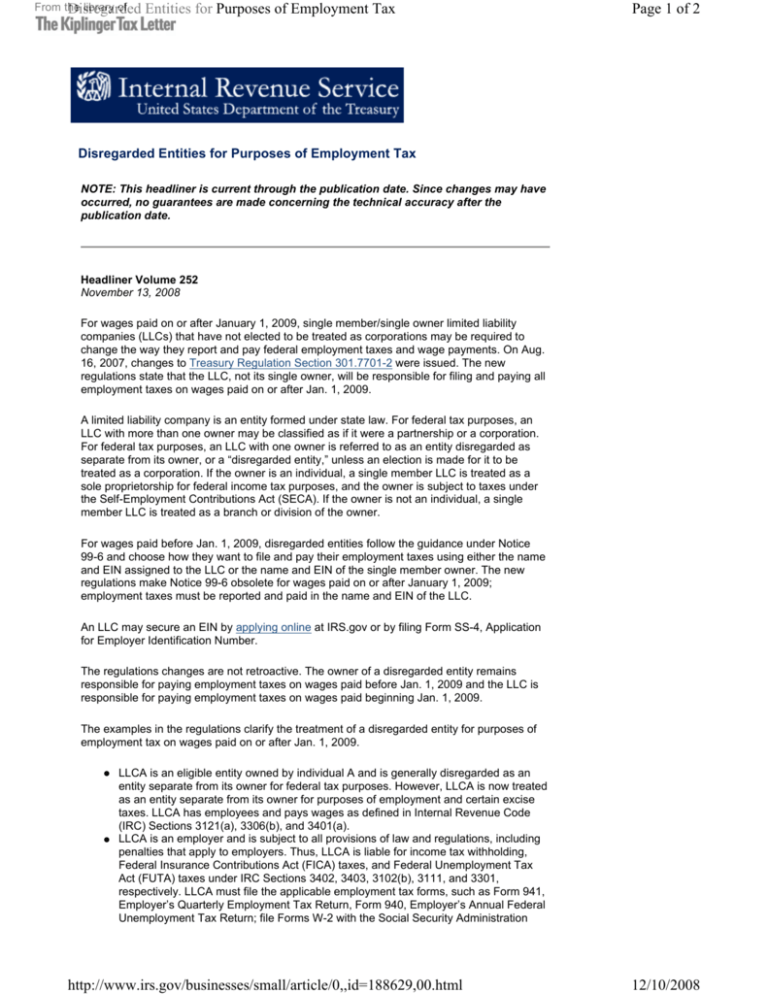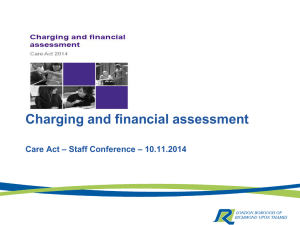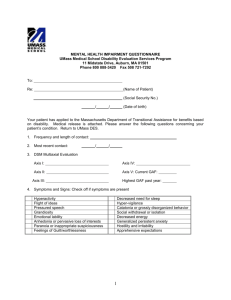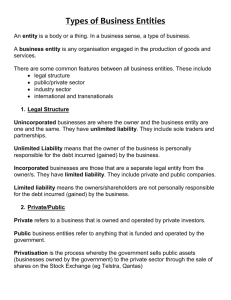Disregarded Entities for Purposes of Employment Tax
advertisement

From the library of Disregarded Entities for Purposes of Employment Tax Page 1 of 2 !-[ifgteIE < ]> nd- Disregarded Entities for Purposes of Employment Tax NOTE: This headliner is current through the publication date. Since changes may have occurred, no guarantees are made concerning the technical accuracy after the publication date. Headliner Volume 252 November 13, 2008 For wages paid on or after January 1, 2009, single member/single owner limited liability companies (LLCs) that have not elected to be treated as corporations may be required to change the way they report and pay federal employment taxes and wage payments. On Aug. 16, 2007, changes to Treasury Regulation Section 301.7701-2 were issued. The new regulations state that the LLC, not its single owner, will be responsible for filing and paying all employment taxes on wages paid on or after Jan. 1, 2009. A limited liability company is an entity formed under state law. For federal tax purposes, an LLC with more than one owner may be classified as if it were a partnership or a corporation. For federal tax purposes, an LLC with one owner is referred to as an entity disregarded as separate from its owner, or a “disregarded entity,” unless an election is made for it to be treated as a corporation. If the owner is an individual, a single member LLC is treated as a sole proprietorship for federal income tax purposes, and the owner is subject to taxes under the Self-Employment Contributions Act (SECA). If the owner is not an individual, a single member LLC is treated as a branch or division of the owner. For wages paid before Jan. 1, 2009, disregarded entities follow the guidance under Notice 99-6 and choose how they want to file and pay their employment taxes using either the name and EIN assigned to the LLC or the name and EIN of the single member owner. The new regulations make Notice 99-6 obsolete for wages paid on or after January 1, 2009; employment taxes must be reported and paid in the name and EIN of the LLC. An LLC may secure an EIN by applying online at IRS.gov or by filing Form SS-4, Application for Employer Identification Number. The regulations changes are not retroactive. The owner of a disregarded entity remains responsible for paying employment taxes on wages paid before Jan. 1, 2009 and the LLC is responsible for paying employment taxes on wages paid beginning Jan. 1, 2009. The examples in the regulations clarify the treatment of a disregarded entity for purposes of employment tax on wages paid on or after Jan. 1, 2009. LLCA is an eligible entity owned by individual A and is generally disregarded as an entity separate from its owner for federal tax purposes. However, LLCA is now treated as an entity separate from its owner for purposes of employment and certain excise taxes. LLCA has employees and pays wages as defined in Internal Revenue Code (IRC) Sections 3121(a), 3306(b), and 3401(a). LLCA is an employer and is subject to all provisions of law and regulations, including penalties that apply to employers. Thus, LLCA is liable for income tax withholding, Federal Insurance Contributions Act (FICA) taxes, and Federal Unemployment Tax Act (FUTA) taxes under IRC Sections 3402, 3403, 3102(b), 3111, and 3301, respectively. LLCA must file the applicable employment tax forms, such as Form 941, Employer’s Quarterly Employment Tax Return, Form 940, Employer’s Annual Federal Unemployment Tax Return; file Forms W-2 with the Social Security Administration http://www.irs.gov/businesses/small/article/0,,id=188629,00.html 12/10/2008 From the library of Disregarded Entities for Purposes of Employment Tax Page 2 of 2 and furnish them to LLCA’s employees, and make timely employment tax deposits. A is not, however, an employee of LLCA for purposes of employment tax because LLCA is treated as A’s sole proprietorship for income tax purposes. A is self-employed for purposes of the tax on self-employment income. This means that A is subject to tax under IRC Section 1401 on his net earnings from self-employment with respect to LLCA’s activities. As a sole proprietor, A is entitled to deduct trade or business expenses paid or incurred through LLCA’s activities, including the employer’s share of employment taxes imposed under sections 3111 and 3301, on A’s Form 1040, Schedule C, Profit or Loss for Business (Sole Proprietorship). These changes in the regulations do not change income tax treatment for a disregarded entity or other LLCs, or employment and/or excise tax treatment for LLCs classified as partnerships or corporations. The new regulations also state that otherwise disregarded entities are treated as the responsible parties for reporting and paying certain excise taxes that accrued after Jan. 1, 2008, including those reported on Forms 720, Quarterly Federal Excise Tax Return; 730, Monthly Tax Return for Wagers; 2290, Heavy Highway Vehicle Use Tax Return; and 11-C, Occupational Tax and Registration Return for Wagering; excise tax refunds or payments claimed on Form 8849, Claim for Refund of Excise Taxes; and excise tax registrations on Form 637, Application for Registration (For Certain Excise Tax Activities). Other helpful information about limited liability companies is on IRS.gov, including the following pages: Other Useful Forms for Limited Liability Companies Frequently Asked Tax Questions and Answers-Limited Liability Company Limited Liability Company Frequently Asked Tax Questions-Federal Tax ID Number Single Member Limited Liability Company Publication 3402, Tax Issues For Limited Liability Companies (PDF) http://www.irs.gov/businesses/small/article/0,,id=188629,00.html 12/10/2008





![Your_Solutions_LLC_-_New_Business3[1]](http://s2.studylib.net/store/data/005544494_1-444a738d95c4d66d28ef7ef4e25c86f0-300x300.png)